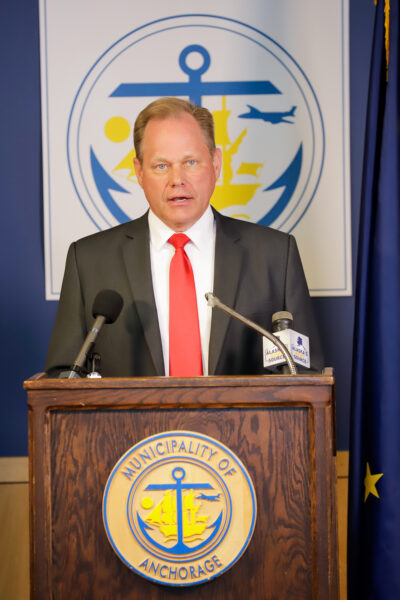Below is the full transcript of a phone interview with Anchorage Mayor Dave Bronson on Tuesday, Sept. 7, 2021. It has been edited for clarity and some context has been added.
Lex Treinen: Going back to the beginning of the administration, the first big project was the building of a homeless shelter. That got shut down by the Assembly in sort of a weird and convoluted way. What did you learn from that? What did you take away from that? And what have you learned about working in politics for the last few months?
Dave Bronson: This may sound weird, but there’s really been no surprises. I’ve been around. I’m old enough to understand what’s involved with politics. It’s hard work, it’s long hours, and you’re always trying to keep up on the most current things. We’re learning.
The secret is — and I’d said this a lot during the campaign — is your team. My campaign team was fantastic and in this team that I have around me right now it is even better.
It sounds weird, but it’s a joy to come to work. And it’s because of the people.

Lex Treinen: Well, speaking of your team, you had some trouble getting a nomination through — a couple of nominations through — the Assembly approval process, most recently with Sami Graham. A few days later, you appointed a new nominee, Judy Eledge, to be the next library director, and several Assembly members say they expect her to be voted down as well. What are you trying to accomplish with this? Do you hope to get this nomination approved by the Assembly? What’s your political goal here?
Dave Bronson: Sami Graham was grossly overqualified for that job. Chief of Staff Niki Tshibaka made the best argument — he spent many hours preparing for that. We made the decision for the Assembly to approve Sami absolutely as easy as possible. They still refused to do that.
That decision by them is actually a bit of a sea change here. We’d spent about six weeks up to that point working well together, at least on the surface I thought. That was a change. When people attack me I expect it, but when you attack my people that’s a whole different thing.
Sami Graham does not need that job. She and her husband are financially well off. She did that as an act of public service and they attacked her competency. She’s grossly overqualified for that job. And they just don’t like her. And they use the qualification metric as their justification for it.
But what that did is it kind of flushed out the people who are going to work against me no matter what. And that’s actually very good to know. I think on the left, you saw Chris Constant demonstrated reasonableness and voted for Graham and John Weddleton. Now we know where the lines are drawn. And that’s fine.
I can operate under those more combative rules. I will. But you don’t get to attack my people and not — let’s just call it what it is — pay a price. I don’t put up with that at all.
Lex Treinen: It sounds like you’re saying that that denial of your nominee was a little bit of an escalation in your eyes. And you’re showing that you’re willing to fight head-to-head with the Assembly over this. Are you confident that you can get your agenda passed, and that an escalation of the sort of tension between the Assembly and your administration is a good thing for the city?
Dave Bronson: I hate to sound like a child on the playground, but I didn’t start this. We came out to this on July 1, wanting to work with the Assembly. We knew there’d be conflict but we knew we’d agree on 80% of the things: we still need to plow streets and fix potholes and all the stuff that it takes to run a city.
But attacking Sami, that wasn’t just a small escalation, that was a very significant one. I understand that. That’s the way they’re going to play the game from now on. And it’s just, how we’re going to interface with the Assembly.
“Attacking Sami, that wasn’t just a small escalation, that’s a very significant one.”
Dave Bronson
Lex Treinen: Let’s move on to COVID. Hospitalizations are at the highest level they’ve ever been. You’ve said you’re committed to getting the accurate information out about COVID, but not doing any restrictions or business closures. If hospitalizations keep rising, and the emergency rooms keep filling up — and we keep hearing these stories about people not getting care in the ER — is there a point at which you would be willing to reconsider your stance on mask mandates and business closures, things like that? Or is that just a hard no, that’s just not something that you’ll never consider?
Dave Bronson: No.
Lex Treinen: So if we hear that people were not getting care in the ER — waiting in lines, people out of the doors — you would not consider any business closures or mask mandates?
Dave Bronson: I would look at the cause of the people standing outside. We simply need to — quite frankly — follow the science on this and we can look at the jurisdictions over the last 18 months. Now the meta-analysis is quite clear. In those jurisdictions, whether state, local or national, that did shutdowns vs. not shutdowns, the data is quite clear that the results are about the same. But the economies aren’t destroyed.
[Sign up for Alaska Public Media’s daily newsletter to get our top stories delivered to your inbox.]
Lex Treinen: Sorry to interrupt there, but just so I know what you’re referencing, can you reference that study? I’m not familiar with that analysis.
Dave Bronson: Well, the meta-analysis where you start to study large populations with large sample sizes. So let’s compare two identical countries in population, Sweden and Israel. And even today, Israel is having a great deal of problems. They’re at 98% — I think 96% or 98% — vaccination rates and they’re still having huge breakthrough cases. And their economy is definitely harmed.
(Editors note: Sweden and Israel have similar vaccination rates. Israel has recently experienced a wave of cases driven by the highly-contagious delta variant and instituted new restrictions. Sweden avoided many restrictions during the pandemic but has experienced a higher death and hospitalization rate than Israel and its Nordic neighbors. You can compare the two countries’ COVID outcomes here.)
You can compare, say, states like South Dakota — actually the better choice would be Florida vs. California. One was an extreme shutdown mandate state, the other one wasn’t, and Florida’s economy is booming. People are still trying to move in. And their outcomes are about the same. And they didn’t destroy the economy.
(Editor’s note: Florida’s COVID-19 death and hospitalization rate is significantly higher than California’s. You can compare the two states’ COVID outcomes here.)
You can look at smaller states like South Dakota: Governor Kristi Noem did not do a shutdown. And her state has been booming. I used to live there for four years. That state is booming. In the states, the more you shut down, the more economic problems you had.
Lex Treinen: And what about masking? That’s something that’s been suggested that makes it a lot easier to keep businesses open and keep events going on and things like that. Are you willing to reconsider your stance on masking if we were to see continued rise in hospitalizations, or is that in the same category as business closures?
Dave Bronson: Well, again, I keep coming back to the science of this. I’m a data-driven guy. I’ve always been that way. And, I know what a lot of people say, and it’s like their last-ditch, ‘Well, we have to do something.’ And we even hear this from national leaders, ‘We have to do something.’ There’s no study that says masking really works, because they’re not being worn correctly. Masks work in hospitals because those people wear N-95s. And two, they know how to wear them and they wear them properly. So in hospitals, it is helpful. But in public, people are touching their masks, and hanging their masks on their car mirror, they’re not handling masks correctly. And that actually, many people believe that it contributes to the spread of COVID because you’re touching your face very often.
(Editor’s Note: There are numerous studies that show that masks work to slow the spread of coronavirus, including this recent study from Bangladesh.)
I get this from doctors, so I’m not sitting here living in a vacuum. I’m talking to doctors all the time. Some of them are afraid to come out and speak against the public, maybe political issue or perspective of masks. But they said this is ridiculous.
Lex Treinen: At the previous press conference that you held, you said that you hadn’t been vaccinated because the vaccine was experimental. Now that the Pfizer vaccine is fully authorized by the FDA, are you considering getting that vaccine or any others?
Dave Bronson: For me, personally, no, I’m not. I have natural immunity. I had COVID. Our state epidemiologist said, I think over the weekend, that natural immunity is a better immunity than acquired immunity through vaccination. So there is a very small risk of problems with the vaccine. So, you know, for me, I make a personal health care decision. I don’t make other people’s personal health care decisions. And I don’t want anyone making mine.
I’m not against vaccinations. I’ve got a vaccine record that’s quite extensive. And I take vaccines fairly regularly. And so I’m not against vaccines, and I just don’t see the need to take this one since I have natural immunity.
(Editor’s note: There’s conflicting evidence about the relative effectiveness of vaccines versus natural immunity, but the Centers for Disease Control and Prevention recommends that everyone eligible get vaccinated.)
Lex Treinen: The city budget process is coming up. What can we expect from the upcoming budget proposal from your administration?
Dave Bronson: Well, my directive to all the directors and the department heads was: We have to get, throughout the city, a 5% budget cut. The taxpayers demanded that. Property tax has been going up, spending has been going up, that has to end. And we’re well on our way to accomplishing that.
Lex Treinen is covering the state Legislature for Alaska Public Media. Reach him at ltreinen@gmail.com.





